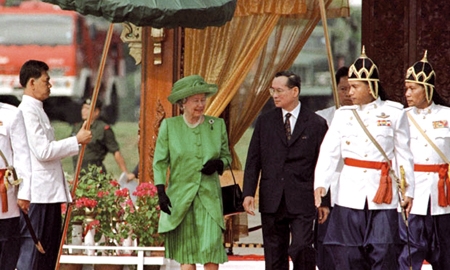A constitutional monarchy since the promulgation of the kingdom’s first constitution in 1932, the Thai monarchy today continues to gather deep, universal respect and serves as a guiding light and unifying force for the country, a focal point that brings together people from all backgrounds and shades of political thought and gives them an intense awareness of being Thai.
While King Bhumibol has done much to earn the high esteem of the Thai people during his reign, it is also rooted in national history and in the succession of impressive rulers stretching back seven centuries, who continue to serve as models for the current royal family.
In similar fashion, although his upbringing is evident in all of his acts, King Bhumibol’s ideals also reflect more than 700 years of Thai history and cultural development.
The Thai monarchy is unique in that it has not lost its relevance in the contemporary world. During the first Thai kingdom, King Ramkhamhaeng carved the following on a stone: “In the fields there is rice, in the water there is fish. The faces of the people shine brightly.” Many hundreds of years later, this philosophy is reflected in King Bhumibol’s lifelong work to improve the living standards of the poor, to stimulate rural economies, and to encourage sustainable living throughout the country.
King Bhumibol’s open style of kingship and cosmopolitan outlook can be traced back to both his great-grandfather King Mongkut and his grandfather, King Chulalongkorn. King Mongkut (Rama IV, 1851-1868), who was ordained as a Buddhist monk at the age of 20, spent 27 years as an important ecclesiastical leader. As a religious reformist, he managed to bring religion firmly into the mid-19th century and made it, once again, a vital force in Thai daily life.
King Chulalongkorn (Rama V, 1868-1910) reigned during some of the region’s most tumultuous history, leaving the stage in 1910 as one of the kingdom's longest-reigning monarchs. King Chulalongkorn brought all parts of the kingdom under the central government and initiated far-reaching development projects – an interest shared by his grandson.
The Rangsit Canal project northwest of Bangkok is a perfect example of this. Crisscrossing more than 100 square kilometres of rice land with a grid of canals for irrigation and transportation, the project nearly single-handedly restored Thailand as the regional rice bowl.
It was also King Chulalongkorn who ordered that Bangkok’s city walls be removed, in an act that reflected the king’s desire to reach out to the rest of the world. He was the first Thai king to travel extensively on state visits, and all of his sons were educated abroad, primarily in London. After their studies, they returned home to oversee a team of foreign advisors engaged in modernising the structure of the Thai government according to international standards.
That King Bhumibol has maintained this special relationship with Britain is evidenced by the fact that Thailand has received two official visits from Queen Elizabeth II (in February 1972 and October 1996) and addresses His Majesty King Bhumibol as her brother.
On the occasion of her second visit, King Bhumibol’s 50th Jubilee, the Queen said, “We are particularly glad to visit you on Your Majesty’s 50th anniversary, and to witness first hand the respect and devotion of the Thai people for the world’s longest reigning monarch.”
During an earlier visit to the UK by King Bhumibol and Queen Sirikit in 1960, the British monarch underscored the strong relations between the two countires.
“I am confident that throughout Your Majesty’s present visit evidence of our respect and friendship for your country will be everywhere apparent and that this occasion will serve to bind still closer the ties which unite our two countries in friendship,” she affirmed in a speech during a state banquet thrown in the Royal visitors’ honour at Buckingham Palace.
Moved by the warm reception of Queen Elizabeth II and the British people, King Bhumibol confirmed this strong connection in his reply.
He said: “In my country, the British character has been very much admired. The sense of fair play, the sporting instinct and the unwavering fortitude – these are the qualities that attract and inspire. For this reason, my grandfather, King Chulalongkorn, chose England as the first country to send the first group of Thai students for study abroad. His choice was fully justified. These students distinguished themselves in their various fields of study; they made valuable contributions to the modernisation, progress and advancement of their country.
“Years of friendly association have created an atmosphere of mutual respect and esteem. There has been very close and beneficial co-operation.”
United by the fact that they are now the longest reigning monarchs in the world, King Bhumibol and Queen Elizabeth II have also seen fit to send their children on official visits. Prince Charles and Princess Diana visited Thailand in 1988, while Prince Andrew visited in 2006, 2009 and 2012. Also this year, which marks 400 years of relations between the two countries, Princess Sirindhorn has visited the UK twice – once for the Queen’s Jubilee and another trip for the opening of the Olympic Games.
2 COMMENTS
Interesting that Yingluck Shinawatra is the current Prime Minister of Thailand and she's the sister of Thaksin Shinawatra who was overthrown in a military coup
May God have King Ananda Mahidol in his memory and may the truth reign in Thailand always.